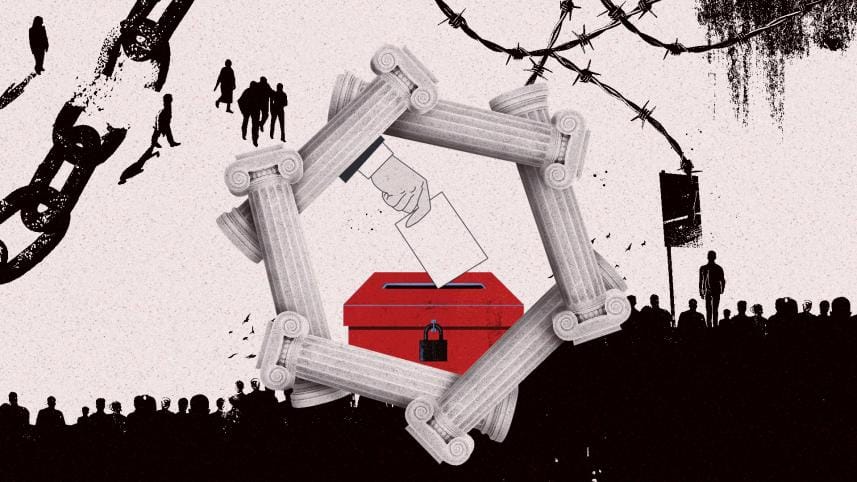How parties can reach a consensus on reforms and elections

In a previous article published in this daily, "Towards a common minimum reform programme," I argued that Bangladesh's deep-rooted political and economic crises demand a consensus-based approach to reform. The interim government's ongoing dialogue with political parties presents a critical opportunity to forge such a consensus. Prolonged uncertainty or a rigid "reform first, elections later" or "my way or the highway" stance will only deepen the crisis. Instead, political parties can thrash out a common minimum reform programme (CMRP)—a set of core reforms based on the max-min principle, where the maximum number of parties agree on a minimum set of urgent measures.
The CMRP is not a panacea, rather a necessary first step towards restoring stability, ensuring democratic governance, and unleashing the economic recovery. At its heart, the CMRP could focus on three core issues: peaceful transition of power, free and fair elections, and representational public order. These are not just political ideals but urgent necessities for Bangladesh's progress. The July 2024 uprising was a clear rejection of the status quo—a demand for a new social contract based on equity, democratic accountability, and economic justice. Fortunately, the recommendations of reform commissions covering elections, public administration, the judiciary, anti-corruption measures, and police activities provide a foundation for engagements and building consensus. Here is an outline of specific areas where political parties could engage in conversation to find common ground.
Breaking the cycle of one-party dominance
The absence of peaceful transitions of power has perpetuated political instability and eroded public trust. There is no denying the need for constitutional safeguards to ensure a neutral body to oversee elections, as was the case under the indigenously crafted caretaker government system. Political parties could also agree on a binding commitment to respect election results and refrain from violence or obstructionism during transitions. These measures would help level the playing field and restore confidence in the democratic process.
Political parties are already talking about instituting checks and balances on the executives, including the powers of president and prime minister, and their terms of office. There is also an agreement to establish a bicameral parliament. Importantly, there is a consensus on increased participation of women, and political parties could work to ensure such representation in the parliament. Additionally, political parties could agree on campaign finance regulations to limit the influence of money in politics and ensure accountability in campaign funding. Another area of discussion is ensuring inclusive participation in elections by guaranteeing equal opportunities for all political parties, including smaller ones.
Restoring voter confidence
There are proposals to address the flaws in the current electoral system. These include implementing biometric voter verification systems to eliminate ghost voters and ensure the integrity of the voter list. Restructuring of the Election Commission to ensure its independence from political influence enjoys broad public support. Commissioners could be appointed through a transparent, multi-party process. Furthermore, ensuring equal access to state and private media for all political parties during campaigns is an agreeable agenda. Finally, inviting reputable international organisations to monitor elections and provide impartial assessments would enhance transparency and credibility.
Safeguarding democracy and accountability
The erosion of democratic institutions and the rise of autocratic tendencies have created a culture of impunity. There is emerging consensus for ensuring the independence of the judiciary, including transparent appointments and fixed tenures for judges. These reforms are essential for restoring public trust and could form part of the CMRP. Similarly, the Anti-Corruption Commission (ACC) must operate free from political interference, guaranteeing transparent appointments, and be equipped with adequate resources and authority to investigate corruption cases independently.
Also, power must be devolved to local governments to ensure participatory democracy and reduce centralisation to establish a citizen's republic. This aligns with a representational public order and could be included in the CMRP. Additionally, the depoliticisation of the police service and ensuring its accountability to the public rather than to the party in power is a basic minimum for a long-drawn process of reforms in civil services. Finally, reorienting police as a part of community is a reform that political parties could support. These reforms are critical for restoring public trust in law enforcement and ensuring a fair and impartial administration of justice.
In addition to ensuring judicial independence by freeing the judiciary from executive and political influence, another area of likely consensus is expediting case resolution by increasing the number of judges and improving court infrastructure.
A call to action
The dialogue convened by the interim government is a historic opportunity to chart a new course for Bangladesh. As the political parties are pledging for the national interest above partisan scoring, they must walk the talk.
The CMRP is not about achieving perfection; it is about achieving the possible. While parties may differ on broader ideological issues, they can agree on core reforms, which are essential for restoring stability and legitimacy. To facilitate this consensus, the interim government and National Consensus Commission must act to ensure that the dialogue process is inclusive, transparent, and focused on the national interest. Civil society, media, and academia also have a role to play in holding parties accountable and advocating for reforms that serve the public good.
By agreeing on core reforms, political parties can restore public trust, ensure stability, and create the conditions for free and fair elections. From there, an elected government can undertake the broader reforms—based on the consensus in the dialogue and people's mandate—needed to address the aspirations of citizens. The people of Bangladesh deserve nothing less than an inclusive, democratic, and prosperous future. Let us seize this moment and chart a new course for our nation.
Dr Rashed Al Mahmud Titumir is a professor in the Department of Development Studies at the University of Dhaka.
Views expressed in this article are the author's own.
Follow The Daily Star Opinion on Facebook for the latest opinions, commentaries and analyses by experts and professionals. To contribute your article or letter to The Daily Star Opinion, see our guidelines for submission.




 For all latest news, follow The Daily Star's Google News channel.
For all latest news, follow The Daily Star's Google News channel. 

Comments